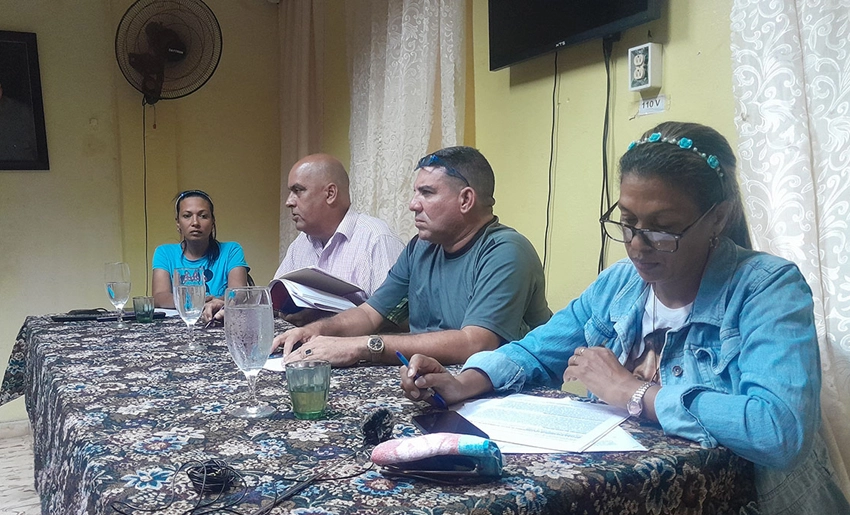The Mayari Government held its first regular meeting of October 2025. During which it evaluated the main management indicators in key sectors. Such as community services, public health, social care, the Food Sovereignty Program (SAN), and the response to voter concerns.
The meeting, characterized by a critical and results-oriented approach. Made it clear that, although there has been tangible progress in government management, structural problems persist that limit population satisfaction.
Regarding community services, the work in solid waste collection with support from local companies. Such as ECOI-16, Pinares S.A., and the Felton Thermoelectric Plant was recognized. However, the number of cart drivers remains insufficient: of 79 approved positions, 34 remain vacant. Voter concerns show an 88% resolution, but 11 remain pending.
Social worker coverage reaches 93%, and the municipality has three senior citizen homes and one functioning nursing home. However, cases of pregnant teenagers (22 in total) and 72 non-compliant schoolchildren persist. In addition to 919 people disconnected from work or school, posing underlying social challenges.
Attention to the people’s concerns: progress in responses, delays in implementation
According to the Secretary of the Municipal Administration Council (CAM), Mayari has a 99.9% resolution of historical concerns, with only 26 pending. However, the analysis of the 18th term reveals that, of 3,024 concerns, 11.8% remain unresolved. And six provincial entities have accumulated unanswered cases, including RadioCuba, the Provincial Water Supply and Railways.
Also of concern is the delay in the implementation of the proposals included in the Economic Plan. Only three of the 21 planned for the first half of the year were met. All in Education—and 18 were delayed, mainly in Health and Water Supply, due to a lack of resources.
The CAM agreed to require the heads of these entities to further analyze the causes and solutions. Emphasizing the quality of their responses to delegates and the public.
Public Health: Professional Stability, but Material Deficiencies
The General Director of Health presented a mixed picture: stability in medical coverage and progress in indicators of the Maternal and Child Program. Although without meeting the goal of addressing low birth weight (6.69%) or the infant mortality rate.
The healthcare infrastructure remains deteriorated: 31 clinics are in fair condition and 60 are in poor condition. With a shortage of materials and a budget for repairs. In hospital services. The lack of supplies limits surgical activity and generates dissatisfaction.
On the epidemiological front, although Aedes aegypti outbreaks decreased by half (153 compared to 319 in the same period in 2024). The infestation rate (0.16%) exceeds the established target. Also with a risk of transmission in the Mayari health area. Staffing the anti-vector campaign remains a challenge, with only 58% of workers active.
Led by Lixan Hidalgo Romerto, acting mayor, and with the presence of Dagmar Abad Noa, First Secretary of the Communist Party of Cuba in Mayari, and Geovanis Martín Gutiérrez, president of the Municipal Assembly of People’s Power. The administrative council directed immediate actions to strengthen medical coverage, control teenage pregnancy, restore outpatient consultations, and accelerate repairs at the municipal hospital.
Food and Nutrition Sovereignty Program (SAN): Planting Achievements, Production Weaknesses
The report from the Deputy Mayor of Agriculture shows that Mayari is meeting its self-sufficiency plan at 81.5%. With 32.5 pounds of food per capita, exceeding the provincial target. Progress is notable in vegetables (113%) and fruits (160%), but meat protein production is zero.
Rice production shows 89% compliance, although with difficulties in the availability of fuel and raw materials. Rural crops—plantain, cassava, malanga, and yams—are far below what was planned. While the mechanized irrigation program only covers 46% of the planned area.
Moreover the decline in cattle herds (-498 head) due to mortality, theft, and lack of destination for surplus animals is a concern for the CAM (Mexico City). Which is demanding urgent action to prevent the collapse of the local meat program.
The governing body agreed to complete the sealing of the 32 irrigation machines before October and to plant traditional crops before November, as measures to close out the quarter.
With information from the Mayari Government Portal
- Prioritizing Care for Children with Disabilities in Holguin - 28 de February de 2026
- Cuba’s Ministry of Foreign Affairs confirms its willingness to cooperate with the United States in the Villa Clara case - 28 de February de 2026
- Divep Company in Holguin Boosts Industrial Production Plans - 27 de February de 2026

